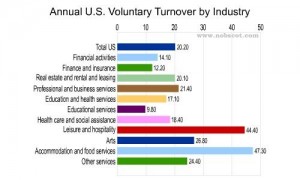 U.S. corporations spend an estimated $2.7 million per year on in-house wellness programs to help employees stop smoking, lose weight, and get fit. They aren’t investing for purely altruistic reasons. They’re investing in their own health, dramatically cutting healthcare costs. Yet they—and, I am willing to bet, you too—are neglecting to invest in another area that is costing American companies billions each year: playing nice.
U.S. corporations spend an estimated $2.7 million per year on in-house wellness programs to help employees stop smoking, lose weight, and get fit. They aren’t investing for purely altruistic reasons. They’re investing in their own health, dramatically cutting healthcare costs. Yet they—and, I am willing to bet, you too—are neglecting to invest in another area that is costing American companies billions each year: playing nice.
BuckSurveys (a division of Xerox Corporation) has conducted its annual “Global Survey of Health Promotion and Workplace Wellness Strategies” for four years. In November 2010, results showed that 74% of U.S. employers engage in some elements of planned “wellness” or health promotion programs. Across several studies, the return on these investments ranges from $1.40 to $13.00 per dollar invested. Despite lacking the ability to precisely track cost savings, most companies indicate they will continue to expand such programs. It feels that good!
So it seems American business is working hard (or at least spending capital) on keeping employees healthy, with the goal of saving healthcare costs and perhaps even the desire to have healthier employees.
But what are we doing for employees if they don’t play well together?
In Egonomics: What Makes Ego Our Greatest Asset (or Most Expensive Liability) by David Marcum and Steven Smith, the authors state that “51% of business people estimate that ego costs their company between 6 and 15 percent of annual revenue; 21 percent say that cost ranges from 16 to 20 percent.”
Further, the authors claim, “63 percent of businesspeople say ego negatively impacts work performance on an hourly or daily basis while an additional 31 percent say it happens weekly.”
Ego, of course, is what we refer to as the Knower/Judger state.
“People don’t leave companies; they leave managers,” say Marcus Buckingham and Curt Coffman in First Break All the Rules. But it’s not only managers or supervisors. It’s a potentially caustic environment of managers, peers, and direct reports. As individuals in a society, we tend to be judgmental, prejudicial, and just plain put off by those without our personal set of beliefs on everything from religion and race to politics and sports. This does not change when we clock in. Add to that our historical conditioning, guiding us to “win at all costs,” or “go along to get along,” and the pot will predictably boil with usually unpredictable results.
What’s the inability to play well with others costing your company, employer, volunteer group, or team? The clash of egos can manifest itself in open public explosions of emotion, or lie bubbling under the surface for weeks causing unfinished projects, lack of cooperation, or even childish setup games. The list of effects includes:
- High turnover
- Loss of good people
- Extra stress
- Wasted motion
- Negative impacts on the bottom line
- Meetings that seem to take forever
- Ego battles at the top
- Accidents in the halls
- People getting even
Turnover alone can cost your organization dearly. Research shows that replacing just one $8.00/hour frontline employee can cost the organization between $3,500 and $25,000, depending on the duties of that employee. But this is just the tip of the iceberg.
The value of keeping one frontline employee can be many times greater than the cost of losing one. Converting someone into a 20-year employee can save 10, 20, or more “turns” on a frontline job: $100,000 or more.
And that’s for an $8.00/hour frontline employee. Care to take a stab at a $250,000 executive?
Remember, people don’t leave companies. They leave managers. So playing well together is very important to the bottom line of the company or the success of the team.
I work exclusively with organizations that want to give their employees the tools to play well in order to ensure a healthy, profitable enterprise. If you’re interested in improving levels of trust, understanding, and camaraderie among employees in your organization, contact me today.

